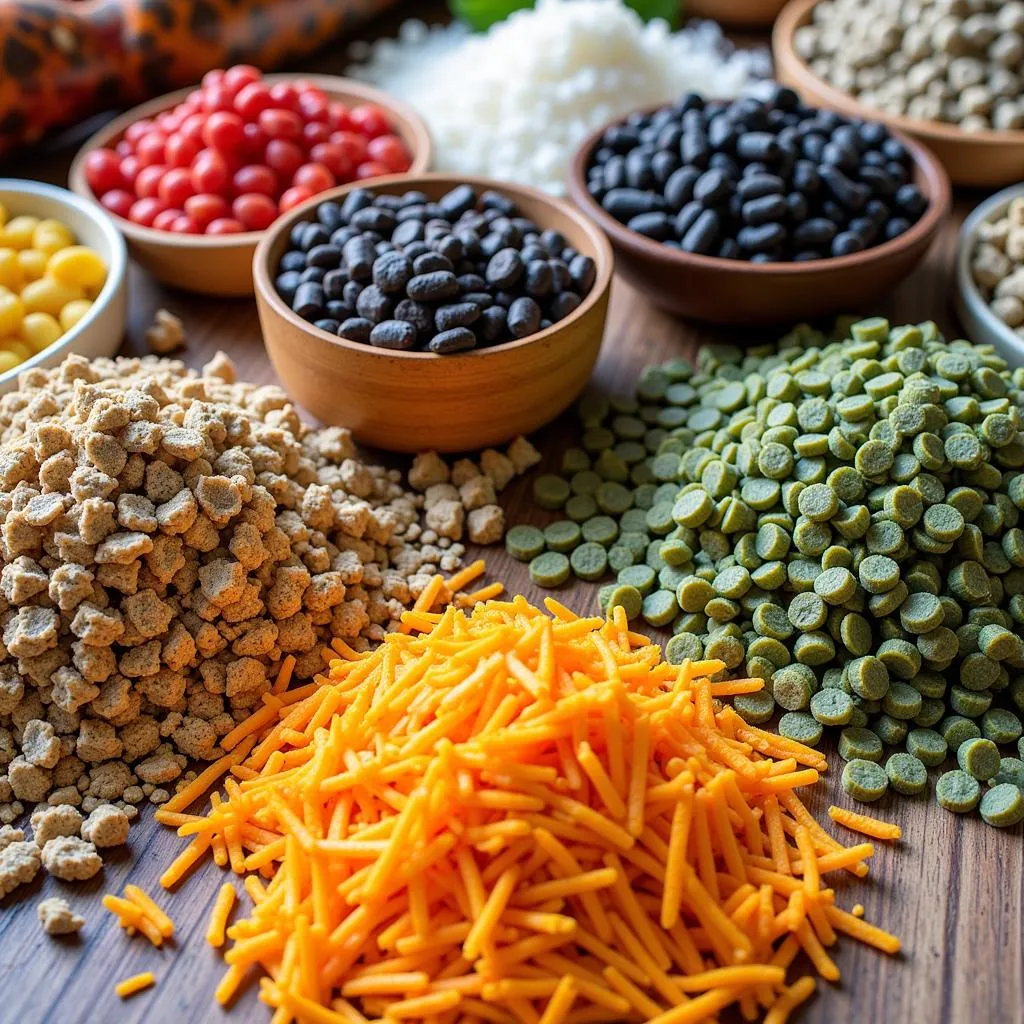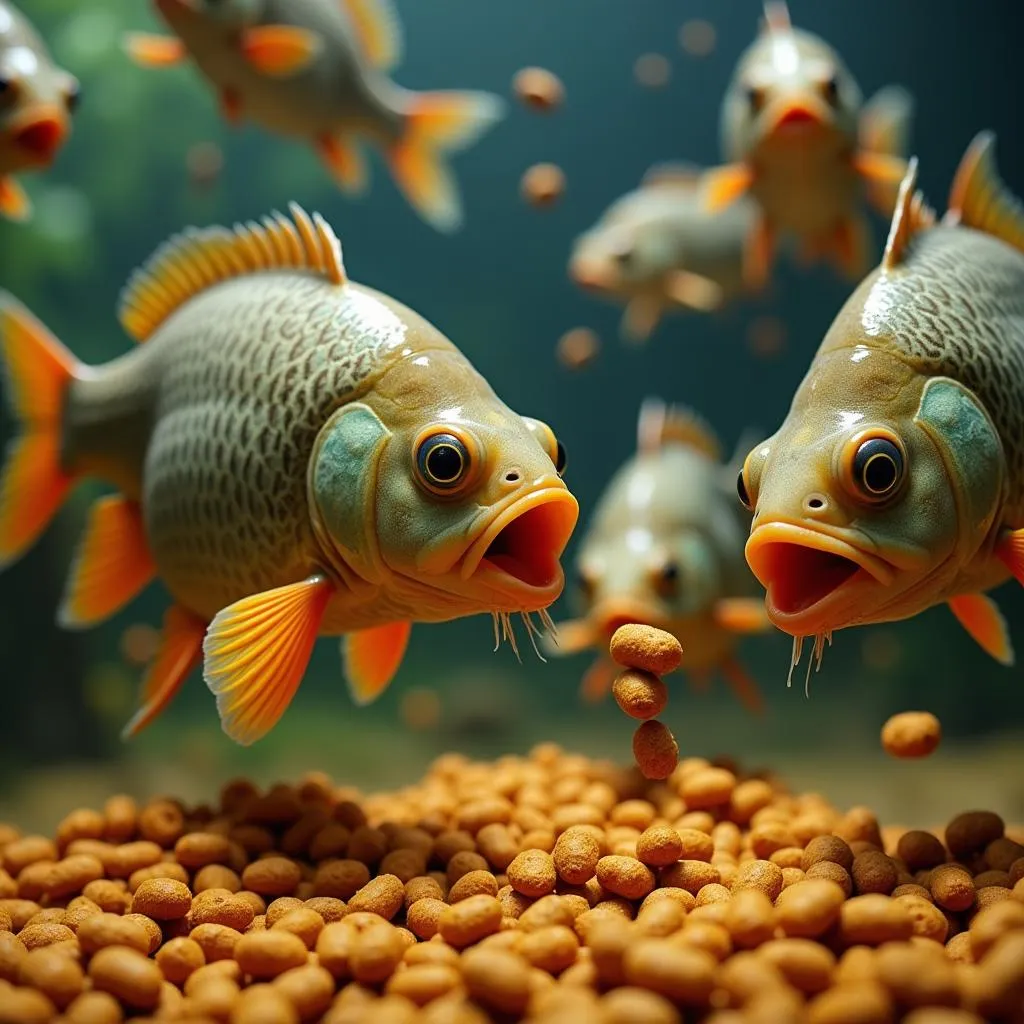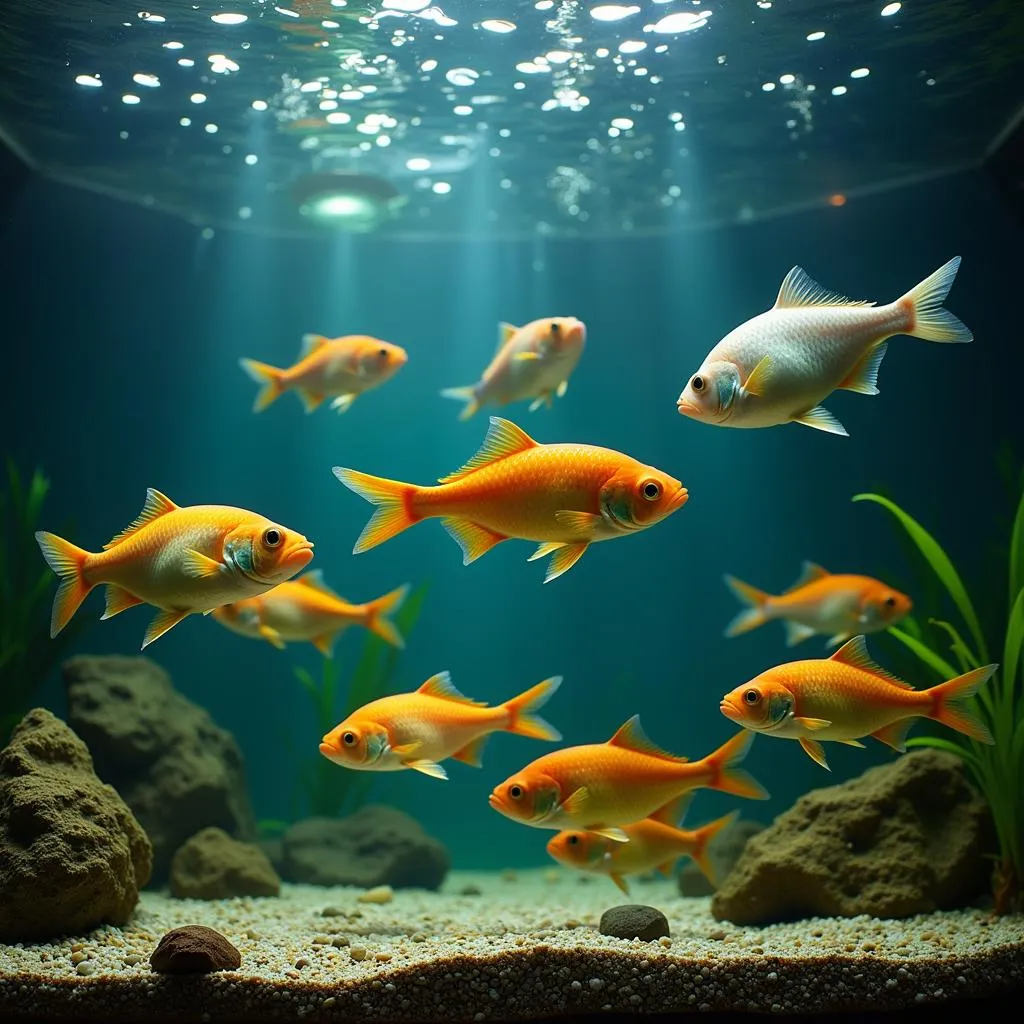Feeder Fish Food plays a crucial role in maintaining the health and vitality of your aquatic pets. Just like any other living creature, feeder fish require a balanced and nutritious diet to thrive in their environment. Whether you’re a seasoned aquarist or just starting out, understanding the importance of high-quality feeder fish food is essential.
 Variety of feeder fish food
Variety of feeder fish food
Why Feeder Fish Food Matters
Feeder fish are often kept as a live food source for larger, predatory fish. However, simply providing any available food isn’t enough to ensure the well-being of your feeder fish. In fact, the nutritional value of the feeder fish directly impacts the health of the fish that consume them.
Feeding your feeder fish a nutritious diet rich in vitamins, minerals, and proteins will not only keep them healthy but also provide your predatory fish with a more wholesome and beneficial meal. This, in turn, can enhance their immune systems, improve their coloration, and promote overall longevity.
Types of Feeder Fish Food
Choosing the right feeder fish food depends on various factors, including the species of feeder fish you have, their age and size, and the type of fish they will be fed to. Here’s a breakdown of the most common types of feeder fish food available:
1. Flakes:
Fish food flakes are a popular and convenient option for feeding feeder fish. They come in a wide variety of formulations, catering to the specific dietary needs of different fish species. Look for flakes that are high in protein and contain a mix of essential nutrients.
2. Pellets:
Similar to flakes, fish food pellets offer a balanced diet for feeder fish. Pellets are available in various sizes, making it easier to choose the right size for your fish. They also tend to be less messy than flakes and can help maintain better water quality in your tank.
 Feeder fish consuming pellets
Feeder fish consuming pellets
3. Live Foods:
Live foods, such as brine shrimp, daphnia, and bloodworms, are a natural and highly nutritious option for feeder fish. They provide essential fatty acids and proteins that are crucial for growth and development. Offering a variety of live foods can also help stimulate their natural foraging instincts.
4. Vegetables:
In addition to commercially prepared foods, feeder fish can also benefit from fresh vegetables. Leafy greens like spinach and lettuce, as well as blanched zucchini and peas, can provide valuable vitamins and fiber.
Choosing the Right Food for Your Feeder Fish
When selecting feeder fish food, it’s important to consider the following factors:
- Species: Different species of feeder fish have different dietary requirements. Research the specific needs of your feeder fish to choose the appropriate food.
- Age and Size: Younger, smaller fish require a higher protein diet to support their rapid growth. As they mature, you can gradually transition them to a more balanced diet.
- Feeding Frequency: Feeder fish should be fed small amounts multiple times a day. This helps prevent overfeeding and maintains better water quality.
The Benefits of a Nutritious Feeder Fish Diet
Providing your feeder fish with a high-quality, balanced diet offers numerous benefits:
- Improved Health: A nutritious diet strengthens their immune systems, reduces the risk of diseases, and promotes overall well-being.
- Enhanced Coloration: Certain nutrients, such as carotenoids, can enhance the natural coloration of your feeder fish.
- Increased Breeding Success: Well-nourished feeder fish are more likely to breed successfully, providing a sustainable food source for your predatory fish.
- Improved Water Quality: Choosing the right food and feeding in moderation can help prevent uneaten food from polluting the water.
 Thriving feeder fish in a well-maintained aquarium
Thriving feeder fish in a well-maintained aquarium
Conclusion
Investing in the right feeder fish food is an investment in the health and well-being of both your feeder fish and your predatory fish. By understanding the different types of food available and choosing a diet that meets their specific needs, you can ensure that your aquatic pets thrive in their environment. Remember, a well-fed feeder fish is a healthier and more nutritious food source for your larger fish.
FAQs about Feeder Fish Food
1. Can I feed my feeder fish the same food as my other fish?
It’s generally not recommended to feed your feeder fish the same food as your other fish. Feeder fish have unique dietary requirements and may not thrive on a diet designed for different species.
2. How often should I feed my feeder fish?
Feeder fish should be fed small amounts multiple times a day. It’s better to offer them several small meals rather than one large feeding.
3. What are some signs of a nutritional deficiency in feeder fish?
Signs of a nutritional deficiency in feeder fish include lethargy, loss of appetite, faded coloration, and increased susceptibility to diseases.
4. Can I gut-load feeder fish to provide additional nutrition?
Yes, gut-loading feeder fish before feeding them to your predatory fish is a great way to boost their nutritional value. Feed your feeder fish a nutritious diet rich in vitamins and minerals a few hours before offering them to your other fish.
5. Where can I find high-quality feeder fish food?
You can find high-quality feeder fish food at most pet stores and online retailers. Look for reputable brands that specialize in fish nutrition.
Need more help?
Contact us! Phone Number: 02437655121, Email: minacones@gmail.com Or visit us at: 3PGH+8R9, ĐT70A, thôn Trung, Bắc Từ Liêm, Hà Nội, Việt Nam. Our customer support team is available 24/7.
For more information about fish food options, check out our article on fish food floating pellets.